MENU
 Home Home
 Programs Programs
 Who
Are We? Who
Are We?
 Articles Articles
 Products
We Recommend Products
We Recommend
 Topic
of the Month Topic
of the Month
 Books
on Running Books
on Running
 In The News In The News
 Past Newsletters Past Newsletters
|

      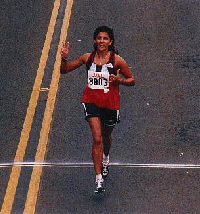 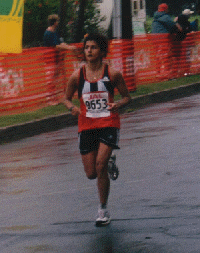 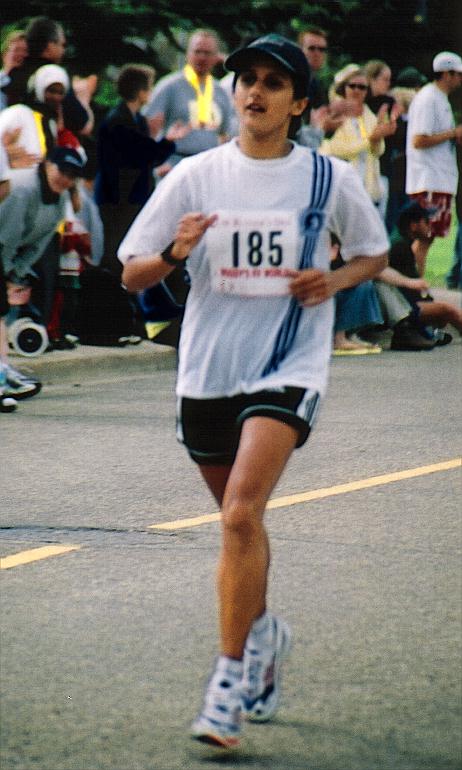 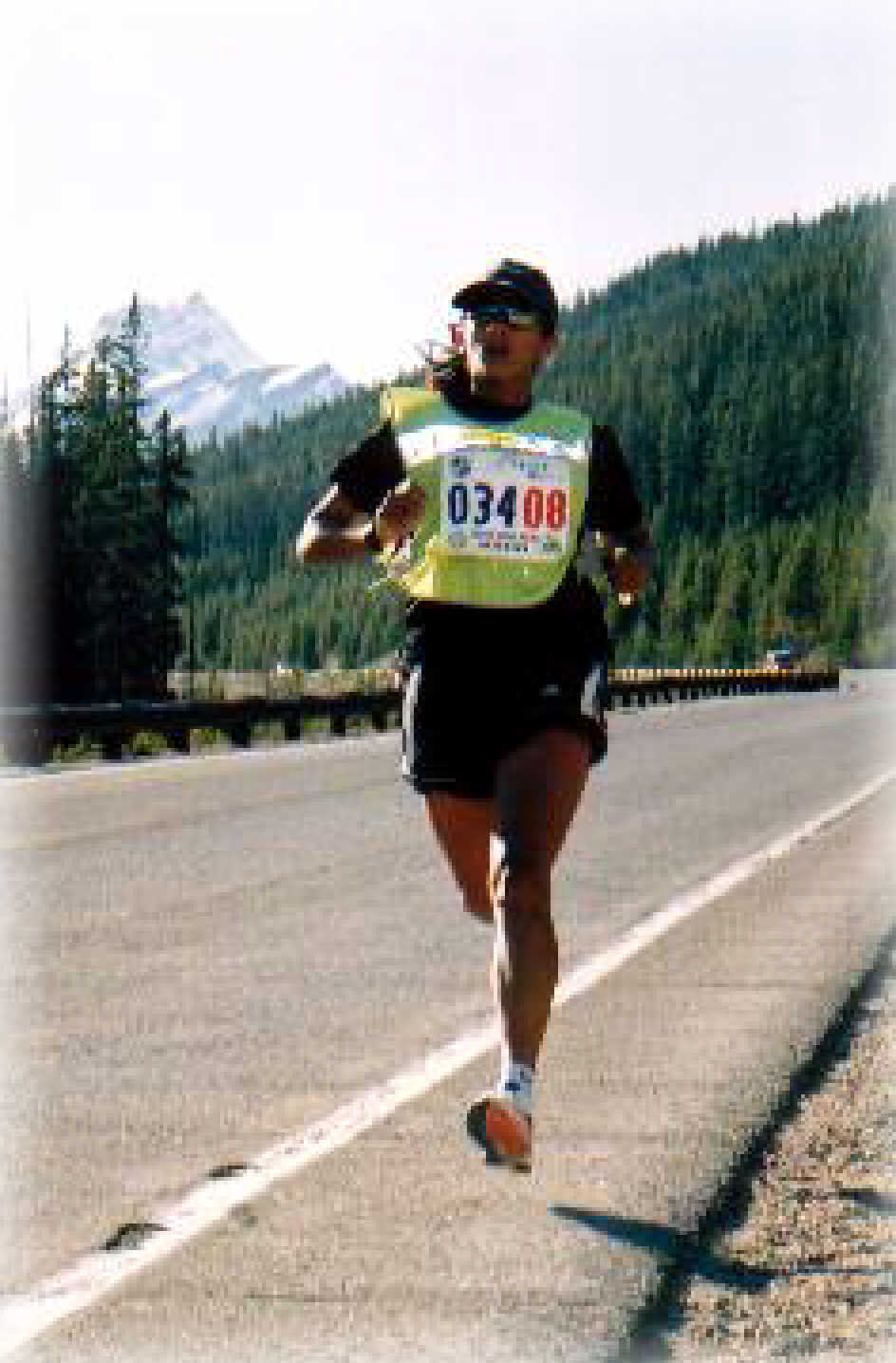  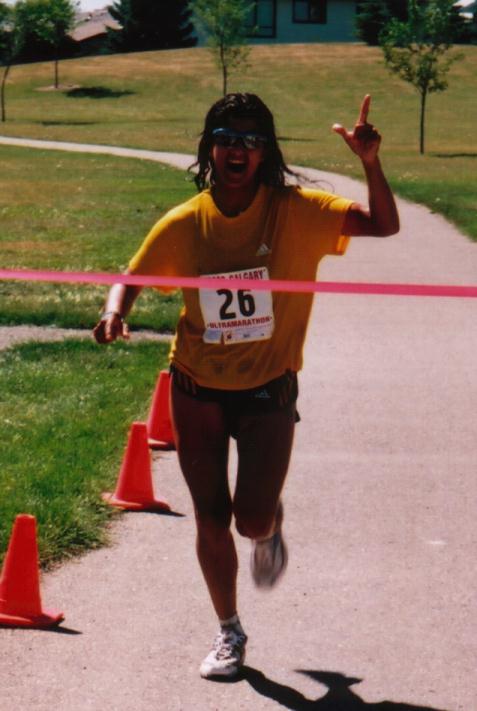
Long Run
Preparation
Preparing for the long run is more than training
for one day. It starts with the whole week.
Weekend only runners don't do
well as the runs progress in distance. If your
schedule gets the way of your training, try to have two
longer midweek runs. Remember, if you miss a day,
do not add the mileage to another run. That day is
gone forever. You need an easy day before the run.
That means either a day off or a shorter run day.
If you don't feel like doing the runs during the week,
that may indicate went too fast or too far the weekend
before.
Food and hydration are important aspects of the long
run. Eat a high carbohydrate meal the evening
before. Watch the consumption of alcoholic beverages as
they tend to dehydrate. If you have a glass of beer
or wine, plan to drink 1 - 2 glasses for each one
consumed.
Plan to awaken 2 hours before the start time and eat
breakfast. Toast, bagel, cereal, yogurt, banana,
juice and water make a light meal. If you drink
coffee, continue to do so. The coffee or food
stimulates the intestine and helps rid the body of the
previous day's food. Drink at least one glass
of water at home and take a full water (one litre) bottle
with you. Drink that water 30 minutes after your
run. Take some extra clothing along as well if you
are driving a ways from home. The weather may be
change. Being over or under dressed can make the run
miserable.
If you are going to be running longer than an hour and
aid stations are not on your route, bring a water bottle
along on the run or plan your run where you have access
to water. You need 6 -8 oz. of water for every 15 - 20
minutes of exercise. Dehydration leads to poor
performance, discomfort, and soreness that may linger for
days. As the long runs progress to 2+ hours in
length, it is important to consume carbohydrates to keep
the glycogen stores replenished. Take
in 100 -200 calories of carbohydrate per hour. You
need to train your body to store and then use this
energy. You can use sports drinks, sports bars or gels or
some simple sugars such as jelly beans and gummi
bears. Remember that bars and gels require water to
get them into the proper concentration to be
absorbed. Half a bar or half a gel pack requires 8
- 12 ounces of water to be absorbable. Sports
drinks were developed to be at the proper
concentration. They encourage fluid consumption
from the addition of flavor and some salts.
Stretching:
Studies show that pre exercise
stretching does not prevent injury and may, in fact cause
injury, due to improper techniques. If you want to
loosen upbefore your run, warm up by some walking or
light jogging. Then perform a little light
stretching. The best time to stretch is after a run
when the muscles are warm and loose. You can also
go home, take a warm shower and then do a complete
stretching program.
When you are finished with the long run you should feel
pleasantly tired and feel like you could do it again
tomorrow. If you are feelexhausted and are
not hungry for several hours, this may be telling you
that you were working too hard.
Your muscles are most receptive to refilling their
glycogen stores in the first 2 hours after the run.
This is the time you need to eat. As mentioned,you
need to train your muscles to store glycogen as well as
to utlilze it slowly. Have some sports drink and sports
bars in your pack so you can start refueling
immediately. The glycogen goes into the muscles
better if it's consumed with some protein. Stop for
the bagel with the low fat cream cheese or peanut
butter. Have the turkey sandwich with the lettuce
and tomatoes or the pancakes with scrambled eggs.
All those thoughts and all that talk about food during
the run indicate that your body needs refueling.
Don't forget the water.
Long Run Checklist
Running clothes & shoes (take more clothes than you
think you need in case the weather may change).
Dry shirt, shoes and socks for afterward Perhaps a fresh
sports bra and shorts.
Water
Sports Drink
Snacks
Money
Use a shoe pouch. Never leave valuables or money in your
car, take them with you.
 Women in Motion August 1.2000 Women in Motion August 1.2000
|







